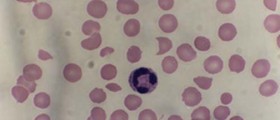Information on Anemia
Anemia is a condition in which blood does not have enough of hemoglobin. Hemoglobin is a protein containing iron and is a constituent part of the red blood cells, erythrocytes, which carry oxygen to all of the body tissues.
Anemia is more often said to be a condition when the body does not have enough red blood cells. Red blood cells decrease in number when the body is deficient in vitamin B12, which is termed pernicious anemia. Pernicious anemia is also known by the names of Addison's anemia, B12 deficiency, and combined system disease. Whatever the name, pernicious anemia affects a great number of people regardless of their age or gender.

Yet, there are some theories that claim that anemia is common among the people of Northern Europe or those with fair hair and complexion. Anemia can be passed on genetically. Autoimmune disease and endocrine gland dysfunctions are also said to be contributory to anemia.
- From a hematological point of view, the most common long-term complications in patients with unrecognized and/or untreated PA are neurological manifestations due to the demyelination of peripheral and central neurons as a consequence of vitamin B12 deficiency; unfortunately, once treated with vitamin B12 supplementation, these alterations are not always reversible.
- Other, harmful and potentially life-threatening complications in untreated or unmonitored PA patients are related to anemia due to iron and/or cobalamin deficiency, which may be severe, with a usually slow and underhand onset, possibly leading to acute cardiovascular complications (acute heart attack), and the risk of thrombosis related to hyperhomocysteinemia, possibly leading to stroke, occlusive artery disease, or venous thrombosis.
- From a gastroenterological point of view, the most severe long-term risk in patients with PA is gastric cancer. In a systematic review in 2013, a 6.8-fold relative risk for gastric cancer and an overall pooled gastric cancer incidence rate per person-years of 0.26% with a range between 0% and 1.2% was shown.
- Patients with chronic atrophic gastritis are also at high risk of developing type 1 neuroendocrine tumors, with an incidence rate of about 0.4–0.7% per year with heterogeneity between studies, in particular in patients with PA.
- Concerning the risk for other types of cancer, excluding gastric cancer, a meta-analysis showed that PA presented a cumulative incidence of 2.4% for a cumulative follow-up of 1855 years, with a higher risk than the general population for biliary tract cancer (1.81: 1.21–2.70) and hematological malignancies such as multiple myeloma (2.83: 1.76–4.55), Hodgkin’s lymphoma (3.0: 1.35–6.68), non-Hodgkin’s lymphoma (2.08: 1.58–2.75), and leukemia (1.56: 1.16–2.12).
Symptoms and Causes
The inability of the gastrointestinal tract to absorb vitamin B12 causes pernicious anemia. The intrinsic factor that is released by the stomach layer is responsible for the absorption of vitamin B12. From the small intestines where the intrinsic factor bounds vitamin B12 to itself, the complex of the vitamin and intrinsic factor then moves to the most distant part of the small intestines called the ileum.
The binding of vitamin B 12 to intrinsic factors facilitates absorption during digestion. Some medical conditions or surgery may impair the small intestines, particularly the ileum, and thus result in the inability of the small intestines to absorb vitamin B12.
The child with parents with pernicious anemia lacking the intrinsic factor genetically gets this condition and is likely to be born with it. Pernicious anemia is sometimes associated with the inflammation of the pancreas, some absorption disorders, Addison's disease, or the overactive thyroid gland. Endocrine disorders when the parathyroid gland does not produce enough hormones can also be the cause of pernicious anemia.
The symptoms of pernicious anemia develop gradually and are similar in some ways to classic anemia. Affected people are usually pale, their heart beatings are fast and irregular, and experience shallow breathing.
Neurological symptoms are the feeling of numbness, weakness, and emotional or mental changes. A person is likely to feel depressed, and agitated, his memory is impaired and sometimes lacks coordination and balance.
A severe and untreated deficiency may result in impaired motor or sensory feelings in the extremities, heart-related problems, and urinary incontinence. A woman who has not been treated for pernicious anemia may have changes in the epithelial cells that line the cervix, and thus the medical examinations of the cervix may be misinterpreted.
Pernicious anemia may also cause gastric problems, lead to polyps, ulcers, and eventually cancers.
Pernicious anemia is a curable health condition. A person is given medications to increase the vitamin B12 in the body.

















Your thoughts on this
Loading...